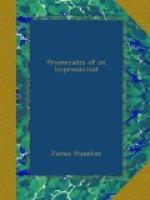In Bernard’s presence he threw a bust made of him by Solari to the ground, smashing it. It didn’t please him. In argument he lost his temper, though he recovered it rapidly. Zola’s name was anathema. He said that Daumier drank too much; hence his failure to attain veritable greatness. Cezanne worked from six to ten or eleven in the morning at his atelier; then he breakfasted, repaired to the “Motive,” there to remain until five in the evening. Returning to Aix, he dined and retired immediately. And he had kept up this life of toil and abnegation for years. He compared himself to Balzac’s Frenhofer (in The Unknown Masterpiece), who painted out each day the work of the previous day. Cezanne adored the Venetians—which is curious—and admitted that he lacked the power to realise his inward vision; hence the continual experimenting. He most admired Veronese, and was ambitious of being received at what he called the “Salon de Bouguereau.” The truth is, despite Cezanne’s long residence in Paris, he remained provincial to the end; his father before becoming a banker had been a hairdresser, and his son was proud of the fact. He never concealed it. He loved his father’s memory and had wet eyes when he spoke of him.
Bernard thinks that the vision of his master was defective; hence the sometime shocking deformations he indulged in. “His optique was more in his brain than in his eye.” He lacked imagination absolutely, and worked slowly, laboriously, his method one of excessive complication. He began with a shadow, then a touch, superimposing tone upon tone, modelling his paint somewhat like Monticelli, but without a hint of that artist’s lyricism. Sober, without rhetoric, a realist, yet with a singularly rich and often harmonious palette, Cezanne reported faithfully what his eyes told him.
It angered him to see himself imitated and he was wrathful when he heard that his still-life pictures were praised in Paris. “That stuff they like up there, do they? Their taste must be low,” he would repeat, his eyes sparkling with malice. He disliked the work of Paul Gauguin and repudiated the claim of being his artistic ancestor. “He did not understand me,” grumbled Cezanne. He praised Thomas Couture, who was, he asserted, a true master, one who had formed such excellent pupils as Courbet, Manet, and Puvis. This rather staggered Bernard, as well it might; the paintings of Couture and Cezanne are poles apart.
He had, he said, wasted much time in his youth—particularly in literature. A lettered man, he read to Bernard a poem in imitation of Baudelaire, one would say very Baudelairian. He had begun too late, had submitted himself to other men’s influence, and wished for half a century that he might “realise”—his favourite expression—his theories. When he saw Bernard painting he told him that his palette was too restricted; he needed at least twenty colours. Bernard gives the list of yellows, reds, greens, and




